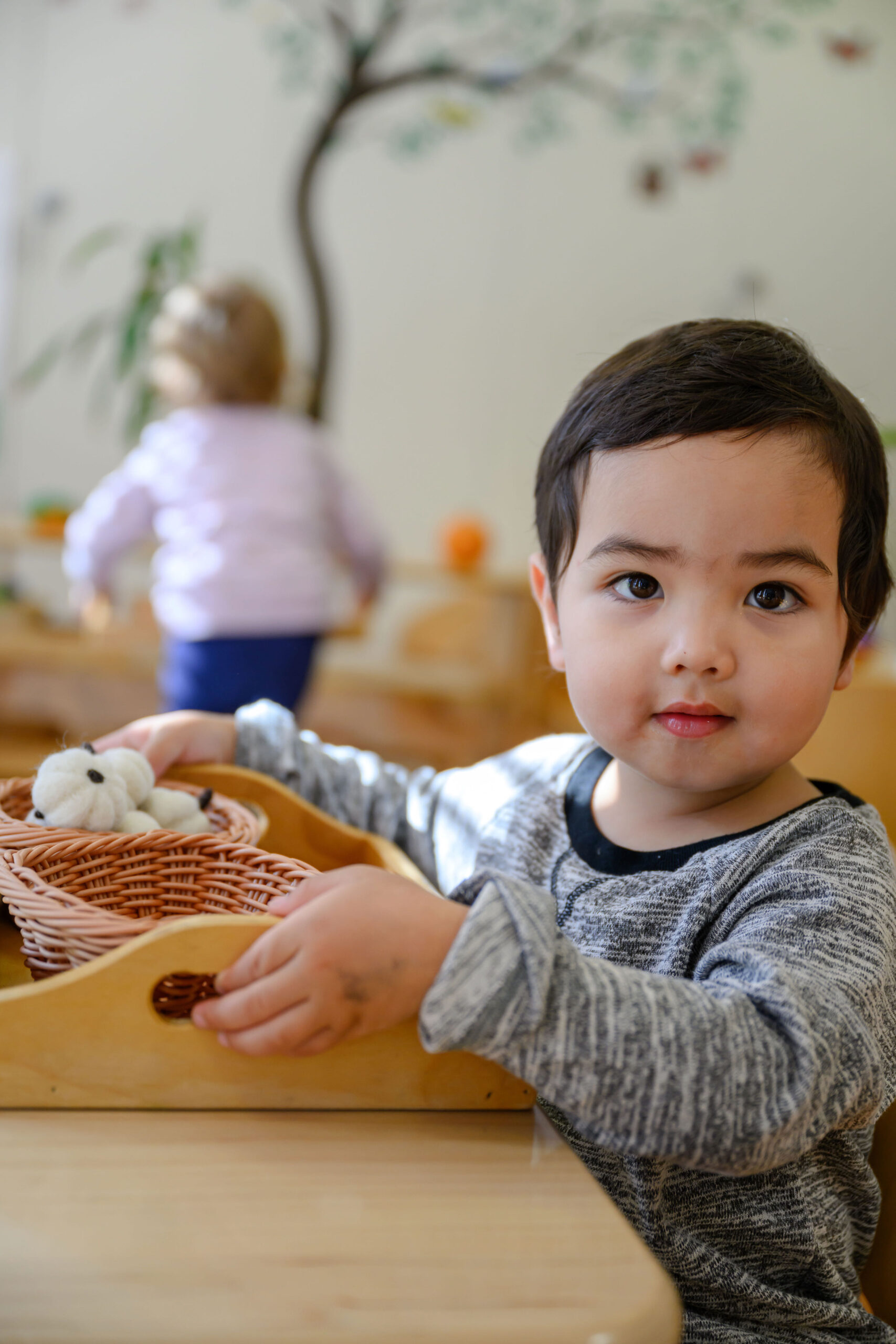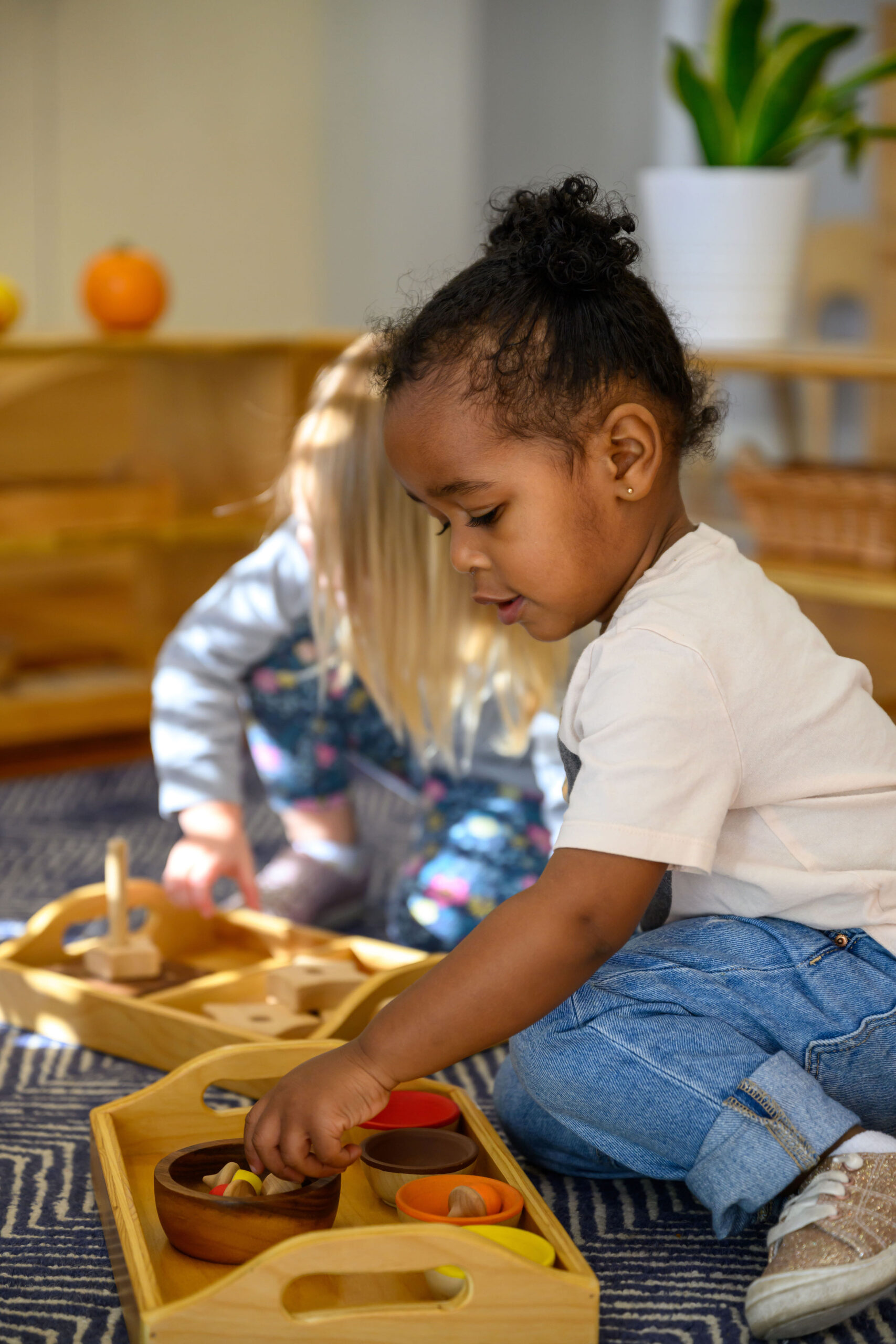In Orientation, we slowly acclimate children into the environment through an individualized transitioning schedule. This helps promote security and independence through clear and consistent boundaries and respect for children and their needs.

Helping Your Child Explore, Grow, & Learn
When children are given the opportunity to do things for themselves, we see an increase in their independence, confidence, social, and problem-solving skills, which help children develop self-regulation skills. When children possess strong self-regulation skills, children can reach deeper levels of concentration, focus, and critical thinking.
Explore our curriculum below, including math, language, practical life, toilet awareness, sensorial, and gross motor/physical development.
Dr. Maria Montessori believed that mathematical concepts are best introduced to toddlers through everyday, natural experiences from their environment. In Orientation, we foster the joyful and eager acquisition of mathematical concepts. Mathematical concepts learned in Orientation vary and may include rote counting, sorting, spatial awareness, one-to-one correspondence, sequencing, and connecting numerals to quantity.
Children must first learn things concretely before they can understand things abstractly. Concrete, hands-on activities indirectly help lay the foundation for the concept of order, sequence, measurement, and exactness. Through hands-on-activities, children learn concentration, coordination, language skills, problem-solving skills, internal order, how to follow directions, and visual discrimination.
The sensitive period for language is from birth to six years old. An integral part of a child’s life is to be able to use words or language in order to communicate. In the Orientation environment, we focus on spoken language.
Children are extremely sensitive to vocal sounds and mimicking; they are more attracted to human speech, than to any other sound in the environment. In Orientation, we help children develop language skills by speaking to them in clear language, reading to them, allowing them to speak their needs by not guessing or anticipating what they want to say. Daily activities that support the development of language include stories, rhymes, songs, naming everyday objects and experiences, matching cards, and puzzles.
Practical life in Montessori is purposeful activity that develops motor control, coordination, independence, concentration, and a sense of responsibility. The exercises in practical life cover two main areas of development.
Care of Self
- Assisting with diapering and toileting skills
- Developing dressing skills
- Body care such as blowing nose and washing hands
- Storing and retrieving personal belongings in cubby
- Respect for body, work, and personal space of self and others
- Body awareness
- Appropriate methods of communication
Care of the Environment
- Completing the cycle of activity (e.g., returning items to shelves, rolling rugs, cleaning spills)
- Care of outdoor environment (e.g., picking up toys, watering plants)
Between 12 and 18 months is the sensitive period for beginning toilet awareness. What makes Montessori toilet learning different is that it follows the development of the child; it is respectful, gradual and at the child’s pace. Children should not feel pressured, punished or rewarded for learning how to use the toilet. Adults must support the child and encourage them, but not become emotionally involved.
- Prepare an environment supportive for toilet learning
- Choose clothing that supports dressing and undressing independently
- Incorporate toileting into the child’s routine
- Say “it’s time to use the toilet” rather than “do you want to use the toilet”
- Never force a child to use the toilet
- Do not interrupt a child using the toilet
In the Montessori classroom, the child explores a curated environment and is invited to work with a variety of materials that develop and refine the five senses—seeing, hearing, touching, tasting, and smelling—and build a foundation for speech, writing, and math. Each scientifically-designed material isolates a specific quality such as color, size, or shape. This focuses the child’s attention on this one characteristic and teaches her to sort, classify, order, and develop the vocabulary to describe objects she experiences in the world around her.
Source: https://amshq.org/About-Montessori/What-Is-Montessori/Terminology
As children play, they gain a sense of control over their body and movements, such as the following.
- Jumping
- Walking
- Throwing/catching
- Sitting
- Crawling
- Running/walking
- Climbing
In the Montessori environment, gross motor skills are developed through a variety of activities, including the following.
- Accessing the climbing structure
- Using the words ” walking feet please”
- Pushing the chair under the table
- Sitting in circle time, lunch, and snack
- Yoga movements with books and modeling
Our daughter LOVES going to school at St. Stephen’s! She started at 15 months and we are thrilled to have found such a loving and nurturing environment to carry her all the way through 8th grade. The talented teachers and support staff make all the difference at this authentic Montessori haven in the heart of Houston; the level of care and communication is outstanding! Our daughter is confident and independent, constantly amazing us with her thoughtful questions and “big picture” connections. We can’t wait for our son to enroll in the fall when he’s old enough!



